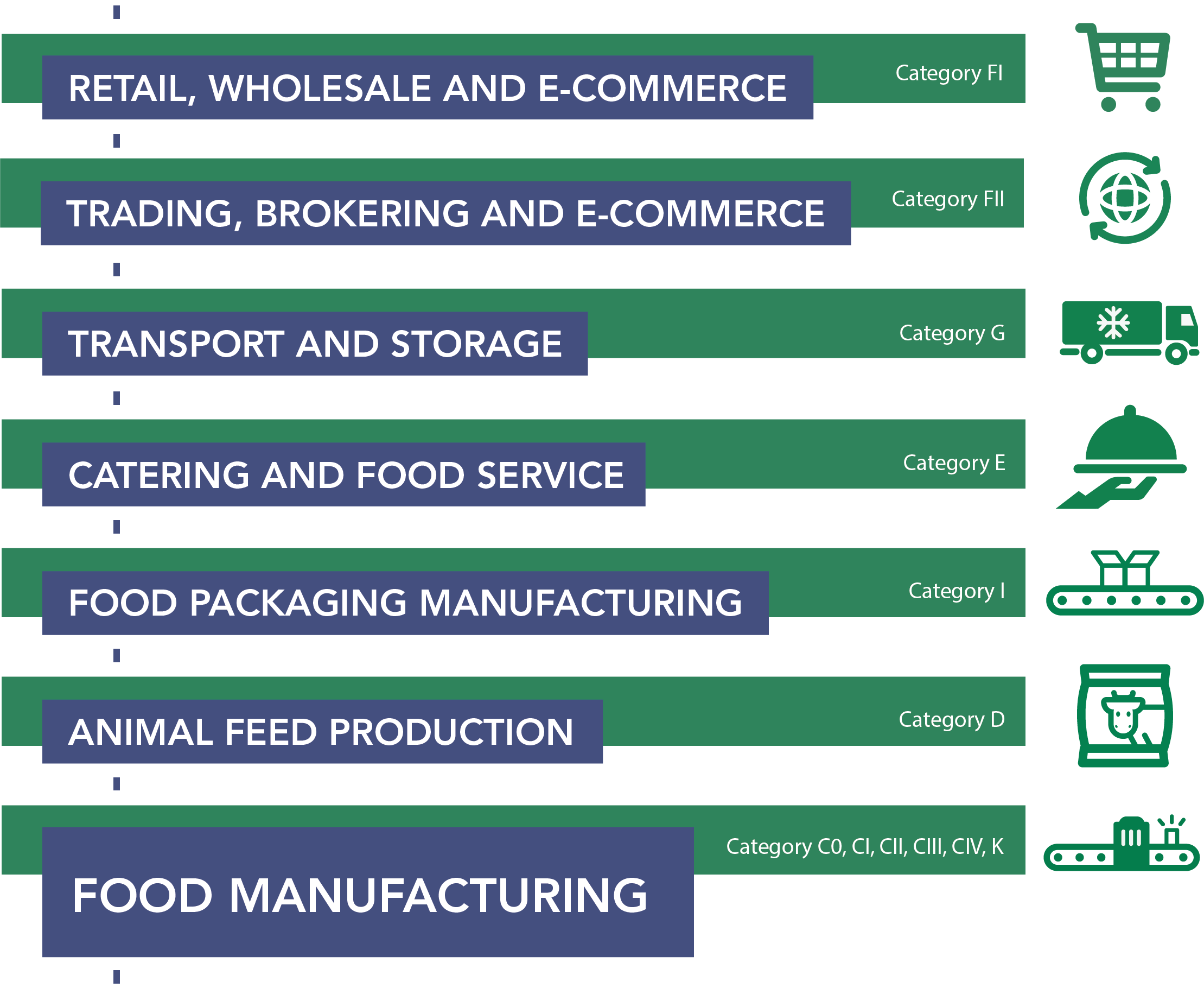Food Manufacturing
One of the most critical challenges faced by food Getting certified supports effective management for manufacturers is product safety because food is vulnerable to deterioration. Risk starts with the wide variety of raw materials and ingredients sourced from diverse suppliers in combination with global and complex supply chains. Releasing unsafe food into the market can have a major impact on public health and result in a loss of consumer confidence, and damage brand reputation.
FSSC 22000 is a risk-based Food Safety Management System (FSMS) that provides a robust solution to meet this challenge through third-party certification. Getting certified supports effective management for controlling food safety hazards, minimizing risks, and producing safe food.
ISO Standards
Using ISO 22000 standard for food safety management and ISO/TS 22002-1, which are the sector-specific prerequisite program requirements for food manufacturing, and additional FSSC 22000 requirements for certification, FSSC 22000 can ensure consistent, high-quality audits that are monitored by an integrity program for measuring and maintaining audit performance worldwide.
"SSAFE is proud to be a member of the FSSC Board of Stakeholders. The strength of the FSSC 22000 program helps advance food safety around the world – something which SSAFE supports and encourages. The continued improvement of food safety systems across the entire food supply chain is important to help drive confidence and build trust that food is safe to trade and consume. FSSC plays an important role in helping to establish that trust.”SSAFE
Benefits of FSSC 22000 certification
- Protect your organization from risk with an international certification Scheme for Food Safety Management Systems (FSMS) that is flexible enough to cover multiple sectors in the supply chain.
- FSSC 22000 incorporates ISO 22000 (for FSMS), which includes the Hazard Analysis Critical Control Point (HACCP) Principles of Codex Alimentarius and ISO/TS 22002-1 – the sector-specific prerequisite requirements for food manufacturing – with the FSSC 22000 Additional Requirements.
- Free from biased leadership, FSSC 22000 is governed by a non-profit foundation and managed by an independent Board of Stakeholders.
- FSSC 22000 is recognized by the Global Food Safety Initiative (GFSI) and approved by the International Accreditation Forum (IAF), providing international acceptance.
- Assists you with meeting relevant regulatory and legislative requirements.
- FSSC 22000 certification delivers high-quality and consistent audits monitored by a robust integrity program and verified by licensed Certification Bodies and qualified auditors.
- FSSC 22000 can integrate your Food Safety Management System with other ISO Management Systems. These may include ISO 9001 Quality Management, ISO 14001 Environmental Management, ISO/IEC 27001 Information Security Management, and the ISO aligned FSSC 24000 Scheme for Social Management Systems.
- FSSC 22000 fosters the delivery of safe food and services to your consumers and customers and, as a side benefit, also elevates the quality of your products and services due to its Additional Requirements on Quality Control.
- Actively contributing to multiple Sustainable Development Goals such as Responsible Consumption and Production, Good Health and Well-Being, and Zero Hunger, FSSC 22000 delivers positive impact beyond food safety.
Food Supply Chain Sectors

Scope
FSSC 22000 can be applied to all food manufacturing organizations, including:
- cheese factories and slaughterhouses,
- grain factories and bakeries,
- fresh and ready-to-eat food manufacturers,
- production of pet food for cats and dogs,
- production of biochemicals (e.g., food and feed additives, vitamins, etc.),
- canned food processing companies, and other manufacturers of food products with a long shelf life.